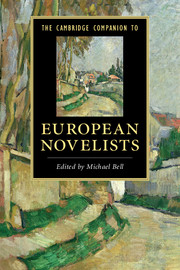Book contents
- Frontmatter
- Introduction: The novel in Europe 1600–1900
- 1 Miguel de Cervantes (1547–1616): Don Quixote: romance and picaresque
- 2 Daniel Defoe (1660–1731): Journalism, myth and verisimilitude
- 3 Samuel Richardson (1689–1761): The epistolary novel
- 4 Henry Fielding (1707–1754): The comic epic in prose
- 5 Jean-Jacques Rousseau (1712–1778): The novel of sensibility
- 6 Laurence Sterne (1713–1768): The fiction of sentiment
- 7 Johann Wolfgang von Goethe (1749–1832): The German Bildungsroman
- 8 Walter Scott (1771–1832): The historical novel
- 9 Stendhal (1783–1842): Romantic irony
- 10 Mary Shelley (1797–1851): The Gothic novel
- 11 Honoré de Balzac (1799–1850): ‘Realism’ and authority
- 12 Charles Dickens (1812–1870): Englishman and European
- 13 George Eliot (1819–1880): Reality and sympathy
- 14 Gustave Flaubert (1821–1880): Realism and aestheticism
- 15 Fyodor Dostoevsky (1821–1881): ‘Fantastic realism’
- 16 Leo Tolstoy (1828–1910): Art and truth
- 17 Émile Zola (1840–1902): Naturalism
- 18 Henry James (1843–1916): Henry James's Europe
- 19 Marcel Proust (1871–1922): A modernist novel of time
- 20 Thomas Mann (1875–1955): Modernism and ideas
- 21 James Joyce (1882–1941): Modernism and language
- 22 Virginia Woolf (1882–1941): Re-forming the novel
- 23 Samuel Beckett (1906–1989): Language, narrative, authority
- 24 Milan Kundera (1929–): The idea of the novel
- Conclusion: The European novel after 1900
- Further reading
- Index
- Cambridge Companions To …
15 - Fyodor Dostoevsky (1821–1881): ‘Fantastic realism’
Published online by Cambridge University Press: 28 September 2012
- Frontmatter
- Introduction: The novel in Europe 1600–1900
- 1 Miguel de Cervantes (1547–1616): Don Quixote: romance and picaresque
- 2 Daniel Defoe (1660–1731): Journalism, myth and verisimilitude
- 3 Samuel Richardson (1689–1761): The epistolary novel
- 4 Henry Fielding (1707–1754): The comic epic in prose
- 5 Jean-Jacques Rousseau (1712–1778): The novel of sensibility
- 6 Laurence Sterne (1713–1768): The fiction of sentiment
- 7 Johann Wolfgang von Goethe (1749–1832): The German Bildungsroman
- 8 Walter Scott (1771–1832): The historical novel
- 9 Stendhal (1783–1842): Romantic irony
- 10 Mary Shelley (1797–1851): The Gothic novel
- 11 Honoré de Balzac (1799–1850): ‘Realism’ and authority
- 12 Charles Dickens (1812–1870): Englishman and European
- 13 George Eliot (1819–1880): Reality and sympathy
- 14 Gustave Flaubert (1821–1880): Realism and aestheticism
- 15 Fyodor Dostoevsky (1821–1881): ‘Fantastic realism’
- 16 Leo Tolstoy (1828–1910): Art and truth
- 17 Émile Zola (1840–1902): Naturalism
- 18 Henry James (1843–1916): Henry James's Europe
- 19 Marcel Proust (1871–1922): A modernist novel of time
- 20 Thomas Mann (1875–1955): Modernism and ideas
- 21 James Joyce (1882–1941): Modernism and language
- 22 Virginia Woolf (1882–1941): Re-forming the novel
- 23 Samuel Beckett (1906–1989): Language, narrative, authority
- 24 Milan Kundera (1929–): The idea of the novel
- Conclusion: The European novel after 1900
- Further reading
- Index
- Cambridge Companions To …
Summary
In Dostoevsky's final novel, The Brothers Karamazov (1880), the eldest brother, Dmitry, laments the ‘broadness’ of man and his simultaneous attraction to the ‘ideal of the Madonna’ and the ‘ideal of Sodom’ (bk iii, ch. 3). This conception of the coexistence of radical opposites within man forms the foundation for Dostoevsky's dramatisation of the ‘accursed questions’ of faith and doubt in a large œuvre of short stories and sprawling novels (as well as a significant body of journalistic writing), which eschews the ‘normal’ in favour of the extremes of human experience and behaviour, and develops an experimental style that contrasts sharply with the realism of his contemporaries Leo Tolstoy and Ivan Turgenev. His novels are populated by nihilists and holy fools, murderers, thieves and monks, saintly prostitutes and femmes fatales, consumptives and epileptics, Christ figures and devils, and would-be Napoleons, Rothschilds and de Sades. Great poverty and huge wealth exist side by side, as the socially disadvantaged – the ‘insulted and injured’, as Dostoevsky called them in his short novel of 1861 – rub shoulders with their exploiters in taverns and slums, monasteries and society salons. Scripture and philosophical debate alternate with violence, sensuality and corruption, in an atmosphere of scandal, melodrama and the grotesque, which owes much to the European Gothic novels the author devoured in his youth, but remains rooted in Dmitry Karamazov's question, ‘How will [man] be righteous without God?’ (bk xi, ch. 4).
- Type
- Chapter
- Information
- The Cambridge Companion to European Novelists , pp. 259 - 276Publisher: Cambridge University PressPrint publication year: 2012
- 1
- Cited by



